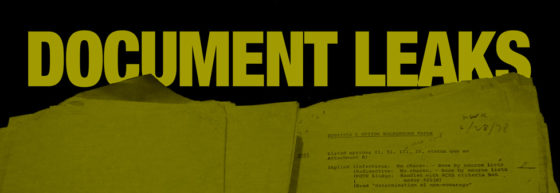Thousands of previously internal industry documents called the “Poison Papers” are now freely available for public review and research in University of California, San Francisco’s Industry Documents Library (IDL).
The “Poison Papers” include approximately 5,000 digitized copies of materials gathered primarily by Carol Van Strum, who reportedly collected over 100,000 documents from her battles with Dow, Monsanto, the Environmental Protection Agency (EPA), National Forestry Service, and others over PCBs, dioxin, and the aerial spraying of herbicide 2,4,5-T in the forest where she lived. The chemical dioxin, a serious pollutant of chemical and pulp and paper manufacturing, was a contaminant in Agent Orange, which the U.S. military sprayed in Vietnam and was linked to serious health problems, including birth defects.
“I collected these papers over decades and am so thrilled that they will be freely accessible to activists, lawyers, community groups, and anyone who is working to challenge the chemical industry’s poisoning of people and our homes,” said Van Strum who gathered and stored the papers over a 40-year period. Additional documents were gathered by journalists Peter von Stackelberg and Eric Coppolino, and environmentalist Diane Hebert, who helped to preserve the documents and make them available to the public.
What did companies know and when did they know it?
PRHE helped to secure the collection for inclusion in the IDL to provide free public access to anyone who is interested in investigating chemical industry behavior or corporate cover ups.
“One of the best ways to hold industry accountable is transparency and I urge policymakers to review these papers to inform systemic changes so that we stop poisoning people first and asking questions later,” said Tracey J. Woodruff, PhD, MPH, professor and director of PRHE, the new Center to End Corporate Harm at UCSF, and co-author of “The Devil They Knew,” an analysis of internal industry documents donated by attorney Rob Billot from his litigation against 3M and Dupont, which hid the health harms of PFAS chemicals for decades.
Growing Industry Documents Collections
The “Poison Papers” documents add to the UCSF Industry Documents Library, established in 2002 with the groundbreaking Truth Tobacco Industry Documents Library, which has fostered scientific and public health discoveries shaping tobacco policy in the U.S. and around the world. The Tobacco collection was followed by archives of documents from other industries including chemical, opioid and other drugs, fossil fuels, and food. All collections have document-level indexing and are cross-searchable, enabling researchers to identify common patterns and links between industries and to study their effects on public health.
“Public archives promote transparency and accountability,” said Kate Tasker, MLIS, Director of the UCSF Industry Documents Library. “Adding the ‘Poison Papers’ to our Library preserves these materials in a centralized and fully searchable database to make this information freely and openly available to the public.”
The Bioscience Resource Project, along with the Center for Media and Democracy, the Park Foundation, and the late Rosalind Peterson provided funding to digitize the documents and contributed the digitized copies to the IDL for long-term preservation and public access.
“The Poison Papers are an incredible document collection. They contain unique and compelling proof of high-level malfeasance and coordinated deception by chemical industry multinationals,” said Bioscience Resource Project Executive Director Jonathan Latham, PhD. “But more, some of its most troubling documents show deep complicity on the part of government regulators, including the EPA and other government agencies. In this they make a spectacular but also unsettling trove.”
Text of this post comes from the website of PRHE (Program on Reproductive Health and the Environment).
